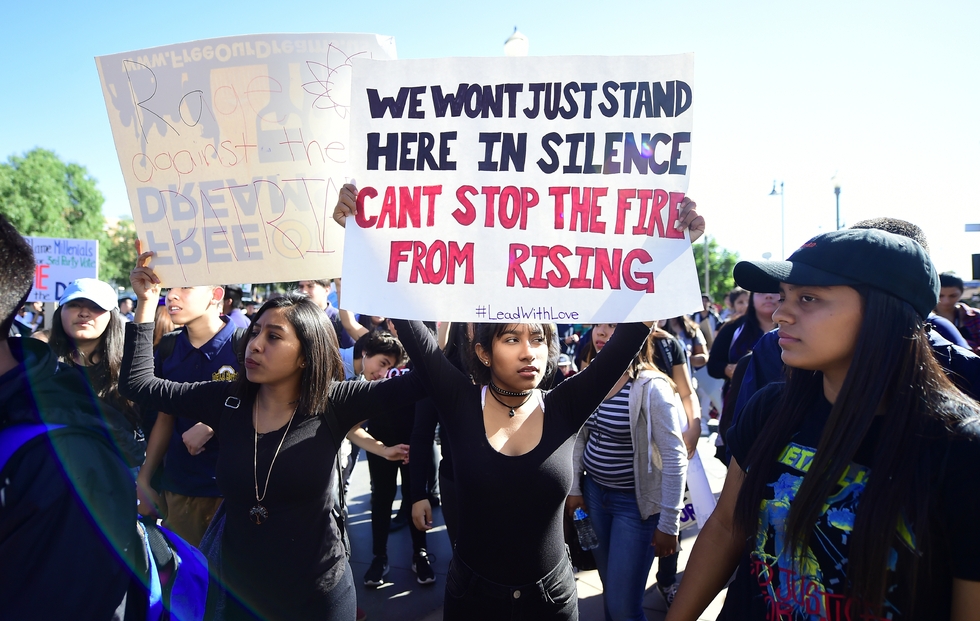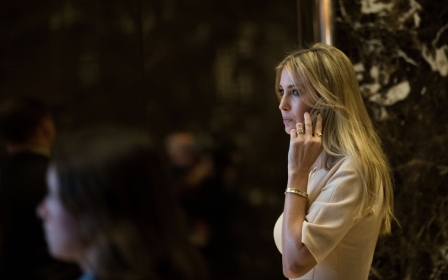US students lead anti-Trump protests, promote tolerance

DEARBORN, United States - Since last week’s US election results, bigotry-fuelled verbal and physical assaults have unfolded in American schools and college campuses.
On Tuesday, students in cities across the United States left classrooms to promote unity and protest against the president-elect’s rhetoric against different religious and ethnic groups.
In Washington DC, hundreds of high school students left their schools and marched to the White House, where they chanted against Donald Trump.
They joined youth across the country who have staged similar walkouts in cities including in Los Angeles, Denver, and Portland since Trump's victory, carrying signs with messages like "spread love," "my black is beautiful" and "make America gay again".
Trump has been slammed for what critics view as divisive and xenophobic policies he proposed during the campaign. The president-elect called for banning Muslims from entering the United States. He also pledged to deport all undocumented immigrants, describing Mexicans who have crossed the US border illegally as “rapists”.
Eva, 16, said the protests gave hope for the future.
"You're looking at it," she told AFP, motioning to the hundreds of rallying students as they marched toward the White House, Trump's future residence.
“We are a diverse school and accepting environment, and we feel the Trump administration is going to try and divide us,” a 17-year-old student told the Washington Post. “We are protesting to show we are united.”
In Los Angeles, students organised demonstrations defying warnings that missing classes could lead to suspension.
"It feels like we're leading ourselves," Suzanne Rueda, 15, told the Los Angeles Times. "We can't vote. This is all we can do."
Dr Ben Herzig, a Boston-based psychologist, warned against dismissing students' concerns about feeling unsafe.
Minority groups who have long felt disempowered feel even more so because of the outcome of the elections, he told MEE.
"Ultimately students can't neglect their education. But seemingly small acts of civil disobedience can be very meaningful, and can allow people to feel like they have a small amount of control over a situation that seems out of control," Herzig said of the protest.
Promoting inclusiveness
In the face of deep political and social divisions, school administrators are promoting inclusiveness and tolerance.
Reports of post-election bullying and attacks have put minority students and parents on edge.
“Build a wall. Build a wall,” shouted students during lunch at a middle school in Royal Oak, Michigan, last week.
They were referring to Trump’s pledge to construct a wall along the US southern border to prevent potential immigrants from crossing illegally from Mexico.
A viral video of the chant alarmed minority groups in the community, prompting the school’s principal to condemn it as “unacceptable”.
“Because this incident, brief though it may have been, made people feel unsafe, it was an incident that requires an unequivocal response from all of us,” Todd Noonan said in a video broadcast to students during announcements, the Detroit Free Press reported.
Not far from Royal Oak, the school board of Grosse Pointe, Michigan, had to defend a high school principal after some parents were unhappy with his response to incidents of discrimination.
Grosse Pointe South High School Principal Moussa Hamka had assured the students that the school will stay welcoming and protect them all.
“We remain committed to fighting bigotry. I stand by our Muslim families, our gay students, our black families, our female students; I stand by our disabled students, our immigrant, our Native American students. I will fight for your rights,” Hamka said in a message, which was read by the school district’s superintendent during a public meeting.
In Seattle, Washington, the superintendent also sent a message to calm students’ anxiety about the election outcome.
In the statement, Larry Nyland, the Seattle schools’ superintendent, highlights the diversity of the district, which he said is home to students who hail from 147 countries.
Nyland said the election was decisive, and even the youngest students are aware of it.
“We are committed to building school communities where all students, families and staff are safe, respected, and engaged,” the statement read. “We expect all students to be treated positively and with respect without fear of bullying or intimidation. Our commitment to the well-being of each and every student is stronger than ever.”
AFP contributed to this report
New MEE newsletter: Jerusalem Dispatch
Sign up to get the latest insights and analysis on Israel-Palestine, alongside Turkey Unpacked and other MEE newsletters
Middle East Eye delivers independent and unrivalled coverage and analysis of the Middle East, North Africa and beyond. To learn more about republishing this content and the associated fees, please fill out this form. More about MEE can be found here.




